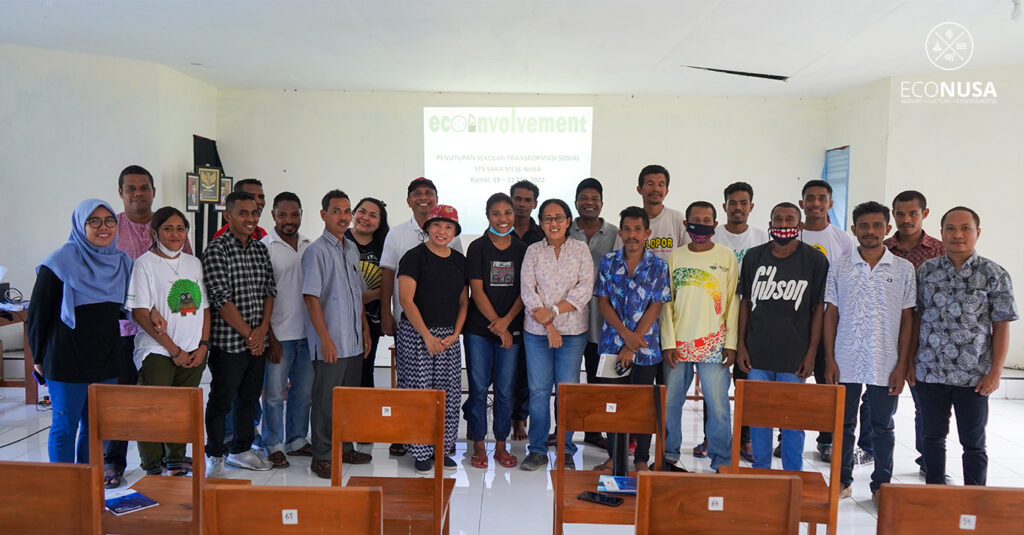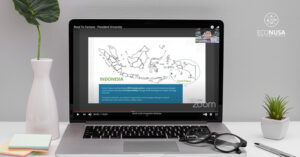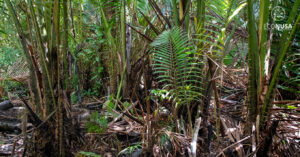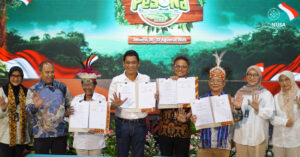
Saka Mese Nusa Social Transformation School (STS) held in Morekau Village, Seram Bagian Barat Regency, on 8-25 February 2021 was concluded this month. The closing was done in Kamal Village in Seram Bagian Barat Regency, Maluku Province, on 19-21 May 2022.
“You have learned in STS a year before and it has been more than a year to practice the acquired knowledge at your villages. The closing is to assess whether or not you passed,” said Zamzaini, a Saka Mese Nusa STS instructor from Insist (Indonesian Society for Social Transformation) on the opening of evaluation session on 19 May 2022.
The closing ceremony was not just ceremonial. The activity was set off by evaluation session. Here, the participants shared their experiences on practising their knowledge from STS at their own villages. Some people shared their experiences in building dryer dooms at their villages. Other participants shared their experiences on organic vegetables farming or plant nurturing by using organic fertilizer for the first time.
Read also: STS Just a Start
“We have done farming long before, but the long term vegetation such as nutmeg. We have never planted vegetables,” said Buce Somae, a participant from Rambatu Village.
On the second day, each participant reflected the changes they made at their villages. Thee were some who could mobilize jobless youngsters to do organic farming consistently. Some others initiated church women to do collective farming. Moreover, some other could make the village government to allocate budget for dryer dome and organic farming.
“Back home from STS, we made coordination with the village government to get support. The government has allotted fund and will be disbursed this year,” said Mesak Pasale, a participant from Buria Village. On the third day, the participants were asked to draft a plan for their villages.
Read also: Mogatemin STS Participant Pledges to Manage Local Shrimp Potential
The Morekau STS was held last year upon the EcoNusa initiative as part of the School of Eco Involvement (SEI). It was intended to bolster the community resilience in natural resource management. The program was attended by 34 youngsters from 13 villages and 2 organizations. They were divided into three groups of study, namely organic farming, biogas, and multipurpose drying classes.
In the farming class, the participants studied on seed raising, organic fertilizer and organic pesticide production with the available materials on their villages, up to rotating vegetation to optimize the crops. In the biogas class, they learned how to build biogas reactor ranging from dung collection as the raw materials to stove and lighting installation. Meanwhile, on the drying class, they learned how to build dryer dome foundation, erect iron frame, create drying racks, up to installing polycarbonate roof.
The STS participants are also called to develop a plan for their villages to local resilience. They were asked to practice their knowledge and mobilize their surrounding communities. EcoNusa and STS instructors several times paid a visit to the participants’ villages to monitor the progress and provide assistance.
Read also: Junior High School Graduates Trains Locals on Organic Fertilizer and Grafting
However, not all participants applied the practice. Some of them stopped due to job offer in town. Some others quit due to the absence of assistance from the village administrative.
“We did not invite those who were inactive,” said the Head of EcoNusa’s Maluku Office, Carmelita Mamonto. There were 10 villages and 2 organizations invited on the closing ceremony and 2 villages were not invited due to remote access. Meanwhile, 1 village was not invited due to inactive STS participant.
The closing ceremony in Kamal ran well. The participants were willing to share their experiences, criticism, and feedbacks from their peers. They wanted to make positive change at their villages. “Our target in the future is to create domestic food resilience,” said Salmon Salenussa, a participant from Morekau Village who was appointed as the principal instructor of Sake Mese Nusa STS.
Editor: Leo Wahyudi, Carmelita Mamonto, Lutfy Putra




